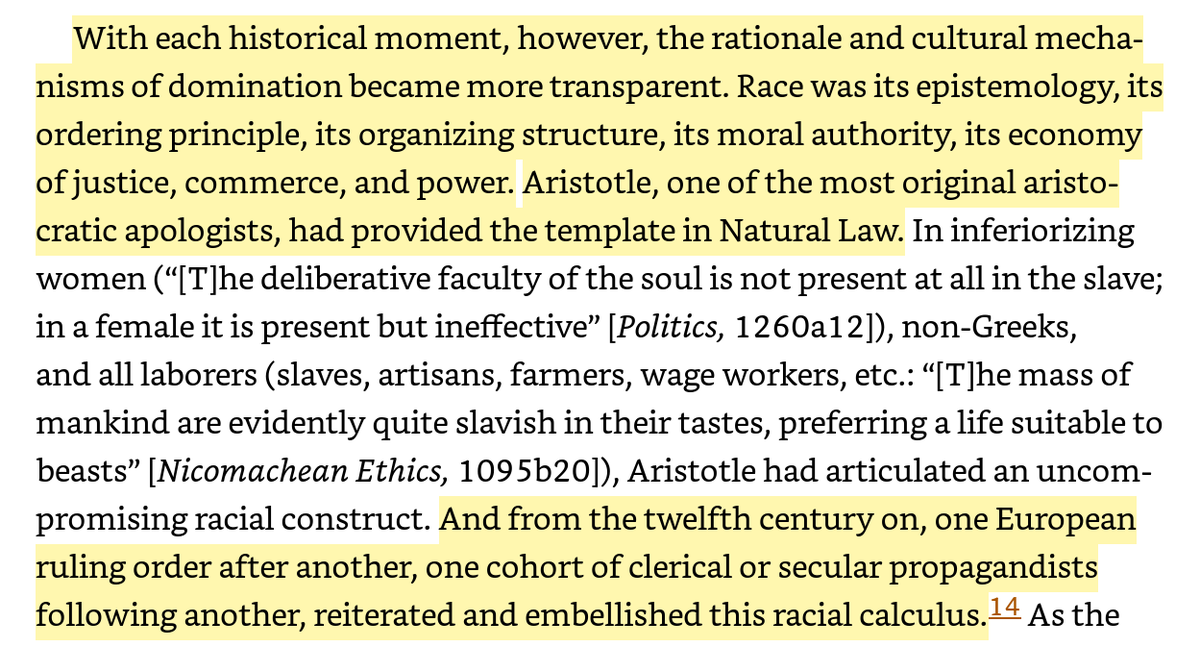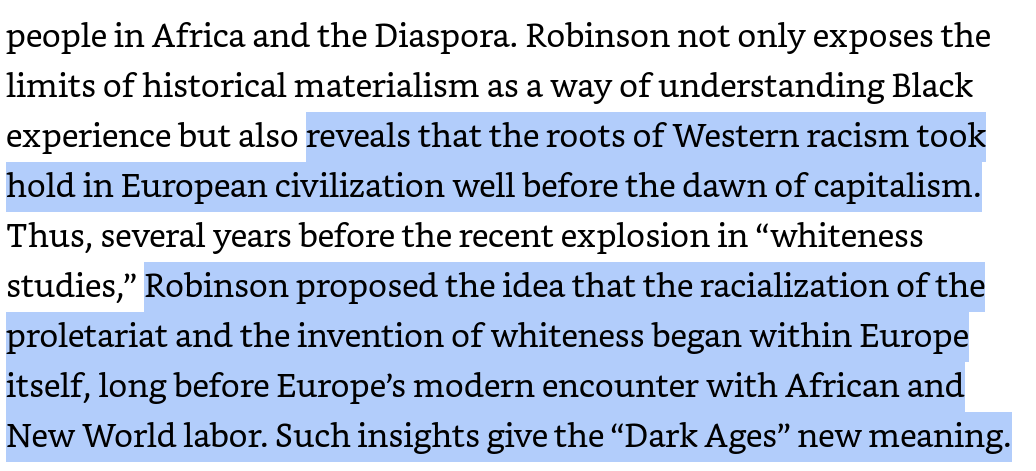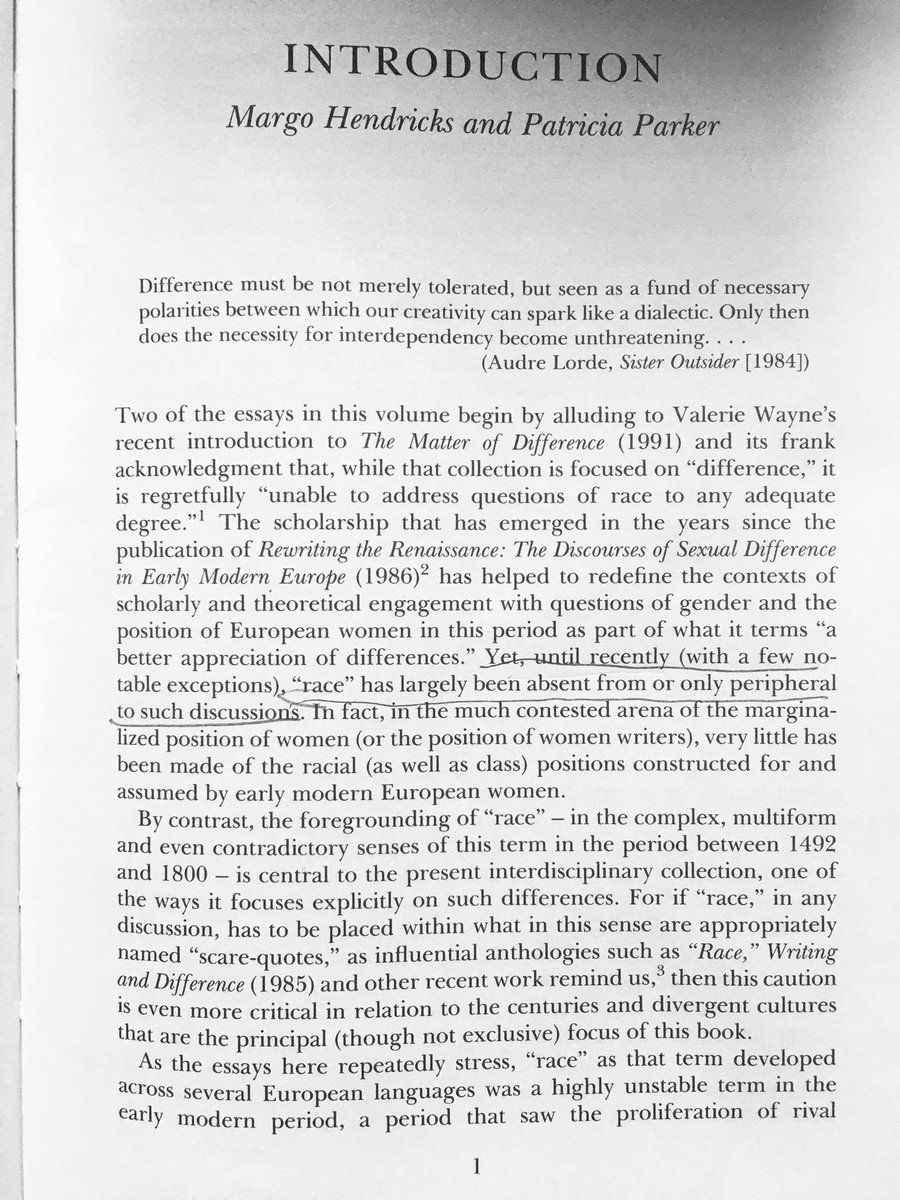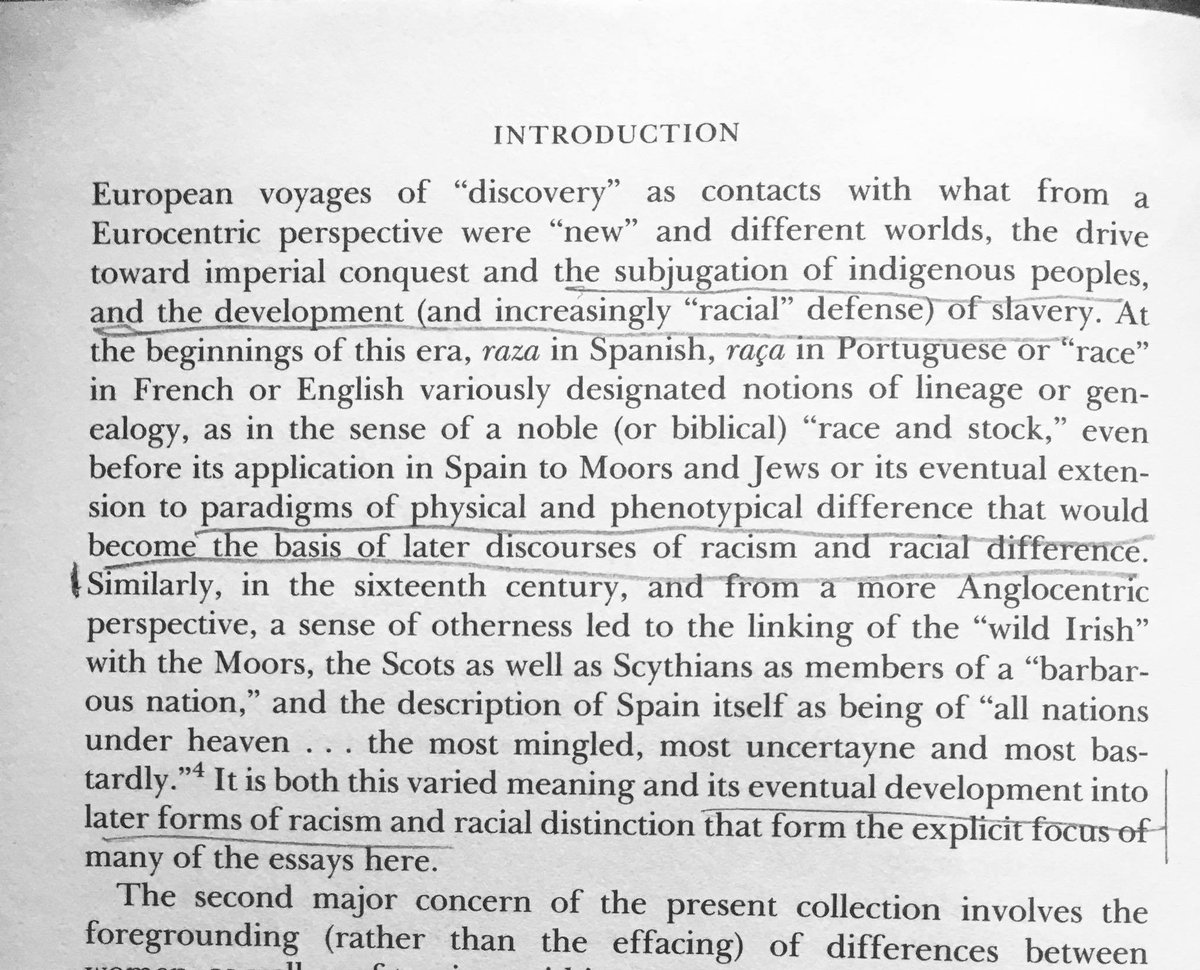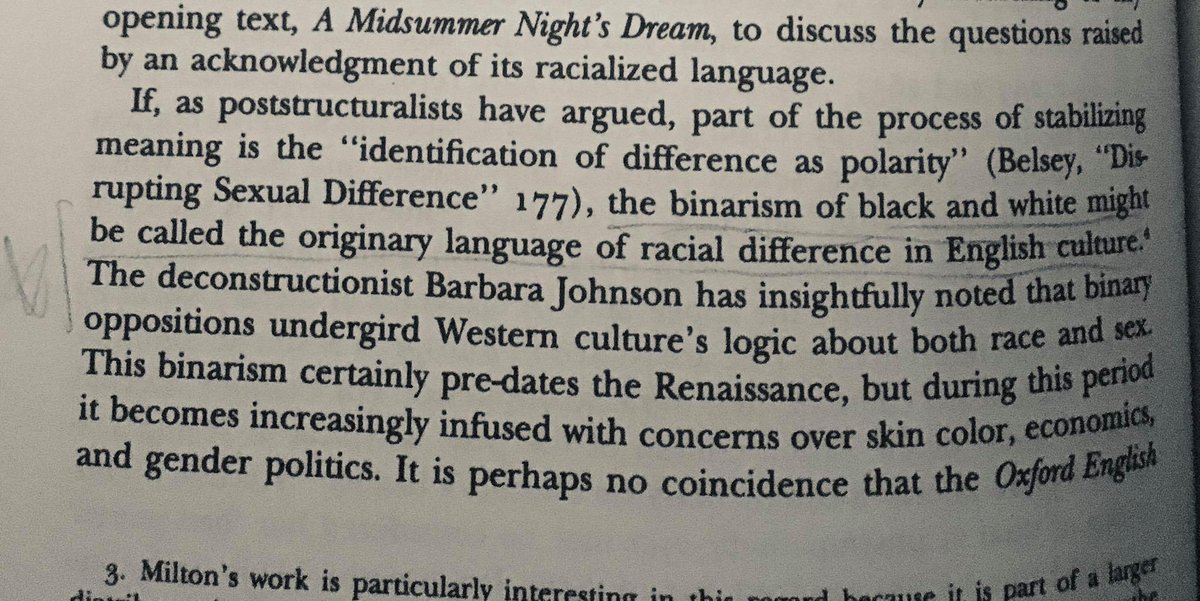Erik Wade ( @erik_kaars) here. Today, I want to talk about other peoples& #39; work. Often when we tell the story of scholarship on pre-modern race, we center the work of white people & we represent these discussions as recent. But that& #39;s....not true. #MedievalTwitter #AcademicTwitter
Dr. Mary Rambaran-Olm and I recently wrote a chronological bibliography of work on pre-modern race studies. It shows how important and central the early work of Black scholars has been, especially Black women. This work is often erased. https://medium.com/@mrambaranolm/race-101-for-early-medieval-studies-selected-readings-77be815f8d0f">https://medium.com/@mrambara...
Let& #39;s take one of the central claims of pre-modern race studies: that skin color & whiteness have a history, and that they were not always important in the Middle Ages. Medieval Europeans (it is argued) did not describe themselves as "white" for centuries.
Black intellectuals and scholars have made this point for *at least* a hundred years. Here& #39;s W. E. B. Du Bois in 1920, in his book Darkwater: "The Middle Age regarded skin color with mild curiosity." He states that some peoples "discovered" that they are white recently.
Again, Du Bois was deconstructing the construction of race and arguing that we need to historicize it, at the turn of the twentieth century. As Matthew Vernon has recently argued in his book The Black Middle Ages, Du Bois frequently drew upon the medieval.
Du Bois made arguments that deconstructed white Western narratives of history throughout his career. He argued for the contributions of Africa and the Global South to Ancient Greek and Roman culture and to European society.
Medieval studies has ignored these arguments.
Medieval studies has ignored these arguments.
This is why the claim that various white medievalists (Tolkien, etc) were "people of their time" is so pernicious. Medieval studies is not simply a "product of its time."
It is a product of medievalists choosing to ignore and erase certain views and voices.
It is a product of medievalists choosing to ignore and erase certain views and voices.
Dr. Mary Rambaran-Olm has written about another example of this: Gordon D. Houston, a Black scholar who worked on Old English and taught it at Howard University from 1912-1919. https://medium.com/the-sundial-acmrs/houston-we-have-a-problem-erasing-black-scholars-in-old-english-821121495dc">https://medium.com/the-sundi...
Back to the history of skin color. The idea that it can be historicized, that its seeming "naturalness" is the product of *political* work, is not a new idea, nor is it simply an academic idea. Black public intellectuals like James Baldwin also discussed it in quite famous ways.
Here& #39;s James Baldwin in his 1962 book The Fire Next Time (perhaps his most famous book), decrying the historical amnesia of white Christians about how their religion emerged in a time "before color was invented."
Baldwin has argued clearly, repeatedly, and urgently that "Color is not a human or a personal reality; it is a political reality."
Baldwin continues, reminding Christians of the Catholic Church& #39;s historical role in the Middle Passage and the enslavement of Black Africans, who -- he argues -- "until that event, incidentally, had not considered [themselves] to be black."
(Baldwin& #39;s use of the medieval is really underdiscussed but is fascinatingly nuanced and subtle. Look out for his subtle little aside about Old Norse sagas in Just Above My Head)
Black Classicist Frank Snowden Jr. wrote two pioneering books (in 1971 & 1991) on skin color in Ancient Greek & Rome, in which he argues that "Homer’s gods […] knew no color line." Snowden& #39;s argument has been criticized since, but his work is rarely cited in medieval studies.
Another scholar, Cedric Robinson, wrote in fairly significant detail about the European Middle Ages in his 1983 book Black Marxism, arguing that the system of race could be traced back to then.
Robinson& #39;s argument is complex, detailed, and studded with references. I won& #39;t attempt to do it justice here, but simply note that he traces the emergence of a Western system of race to Europe around the twelfth-century, one that draws upon older ideas drawn from Aristotle.
Robin Kelley& #39;s forward to the 2000 reissue of Robinson& #39;s book argues that Robinson& #39;s insights have largely been ignored and that he made a masterful, underdiscussed set of claims about the medieval origins of European racism and Europeans claims to "whiteness."
Early modern studies made serious strides in discussing pre-modern race in the early 1990s, with groundbreaking books by scholars like Profs. Margo Hendricks and Kim Hall.
In their anthology, Profs. Margo Hendricks and Patricia Parker centralize discussions of race, pointing out how they have been previously marginalized or ignored in early modern studies, despite the period& #39;s investment in the slave trade and colonialism.
Prof. Kim Hall& #39;s book gives a wide-ranging account of how whiteness and Blackness were constructed in the medieval and early modern periods. She argues that "the binarism of black and white might be called the originary language of racial difference in English culture."
There is a seemingly endless list of scholars of color, particularly Black scholars, who have been deconstructing race and skin color for over a century. Frantz Fanon, Toni Morrison, Angela Davis, etc etc etc. All prior to the race scholars usually cited by medievalists.
When medieval studies claims these conversations are recent, they mean they have only chosen to HAVE these discussions recently. The history of the field is a history of deliberately ignoring and not discussing critiques and historical analysis, largely by Black scholars.
It& #39;s worth noting that many of these scholars are STILL doing this work. See, for example, the AMAZING talk last year at RaceB4Race by Prof. Margo Hendricks: https://www.folger.edu/institute/scholarly-programs/race-periodization/margo-hendricks">https://www.folger.edu/institute...
Or Prof. Hall from earlier this month on Frederick Douglass& #39; relationship to Shakespeare. Prof. Hall continues to do important work excavating erased histories of Black intellectuals engaging with the premodern. https://www.youtube.com/watch?v=-o7wtZt4Dqc&feature=youtu.be">https://www.youtube.com/watch... https://www.youtube.com/watch...
That& #39;s all from me today. Please read & cite Black scholars on the premodern. Please educate yourselves on what& #39;s happening in Kenosha now. And please sign and share the call to strike for Black lives Sept 8-9: https://twitter.com/AntheaButler/status/1298792595750096896">https://twitter.com/AntheaBut...

 Read on Twitter
Read on Twitter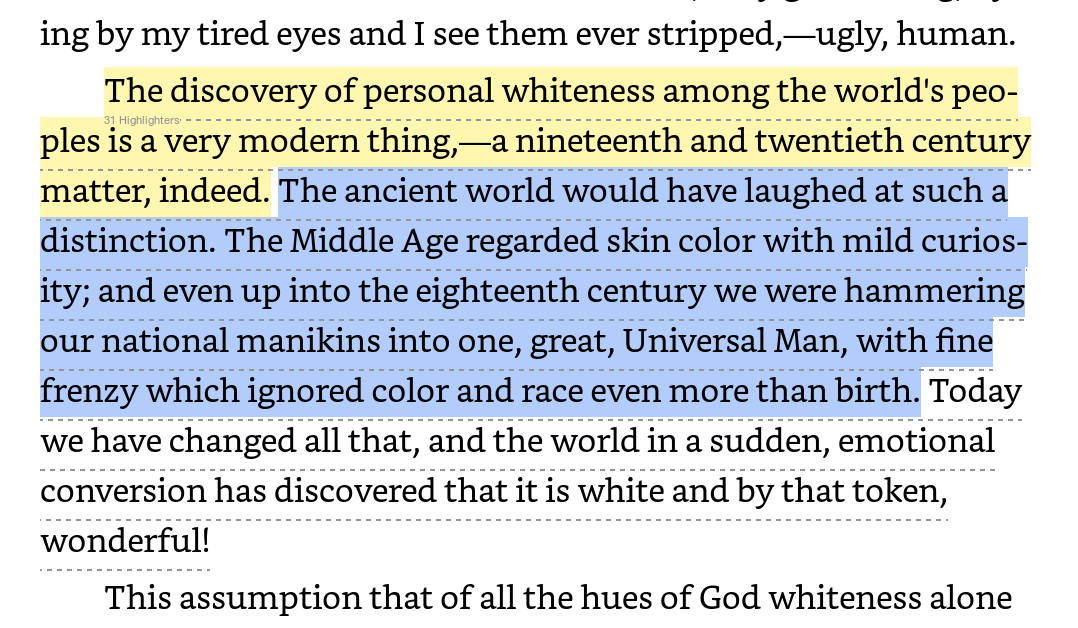

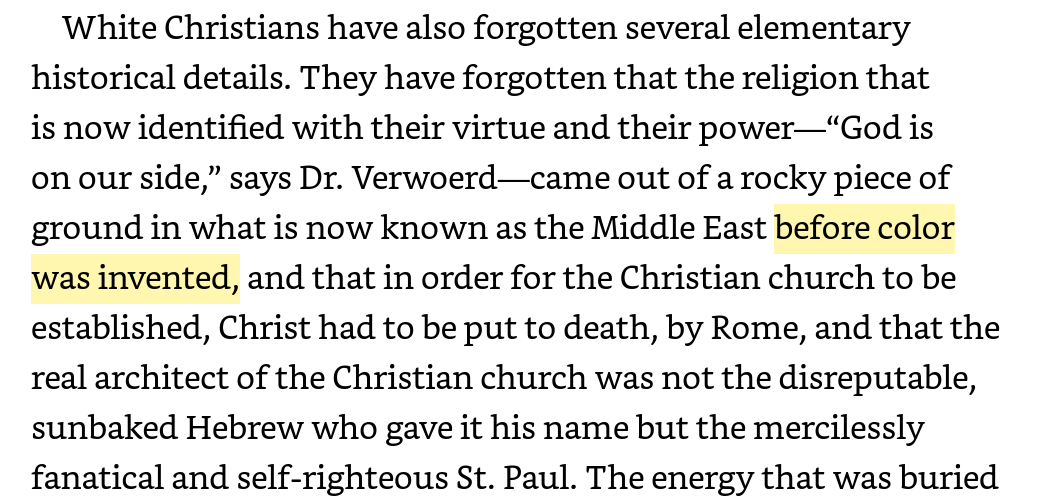
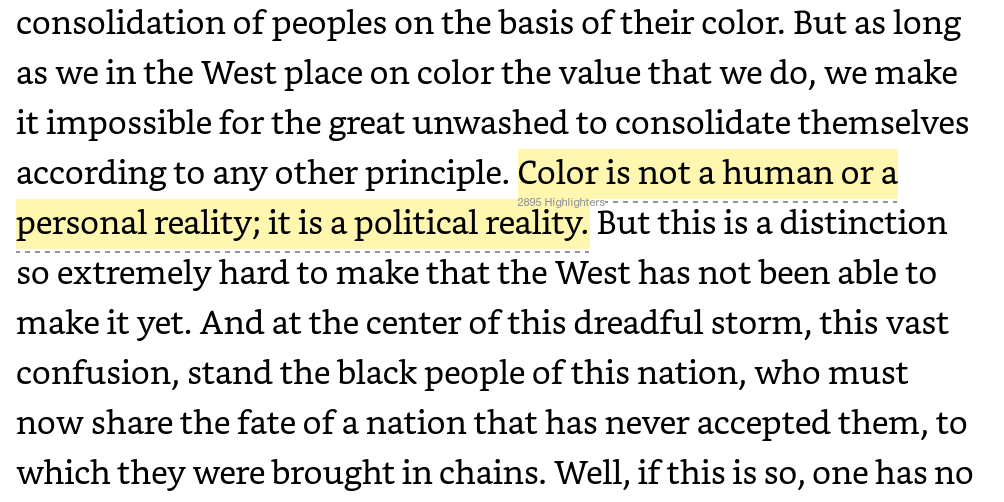
![Baldwin continues, reminding Christians of the Catholic Church& #39;s historical role in the Middle Passage and the enslavement of Black Africans, who -- he argues -- "until that event, incidentally, had not considered [themselves] to be black." Baldwin continues, reminding Christians of the Catholic Church& #39;s historical role in the Middle Passage and the enslavement of Black Africans, who -- he argues -- "until that event, incidentally, had not considered [themselves] to be black."](https://pbs.twimg.com/media/EgbOndxWoAA7A_4.png)
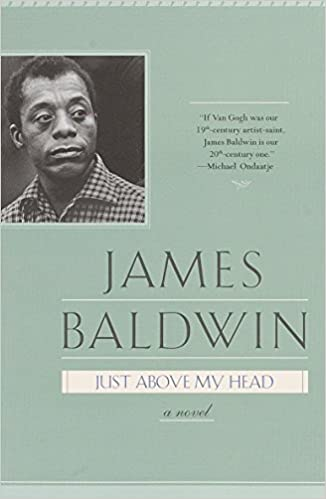
![Black Classicist Frank Snowden Jr. wrote two pioneering books (in 1971 & 1991) on skin color in Ancient Greek & Rome, in which he argues that "Homer’s gods […] knew no color line." Snowden& #39;s argument has been criticized since, but his work is rarely cited in medieval studies. Black Classicist Frank Snowden Jr. wrote two pioneering books (in 1971 & 1991) on skin color in Ancient Greek & Rome, in which he argues that "Homer’s gods […] knew no color line." Snowden& #39;s argument has been criticized since, but his work is rarely cited in medieval studies.](https://pbs.twimg.com/media/EgbRU0mWAAA1gvA.png)
![Black Classicist Frank Snowden Jr. wrote two pioneering books (in 1971 & 1991) on skin color in Ancient Greek & Rome, in which he argues that "Homer’s gods […] knew no color line." Snowden& #39;s argument has been criticized since, but his work is rarely cited in medieval studies. Black Classicist Frank Snowden Jr. wrote two pioneering books (in 1971 & 1991) on skin color in Ancient Greek & Rome, in which he argues that "Homer’s gods […] knew no color line." Snowden& #39;s argument has been criticized since, but his work is rarely cited in medieval studies.](https://pbs.twimg.com/media/EgbRZZ9WoAABP5r.jpg)

